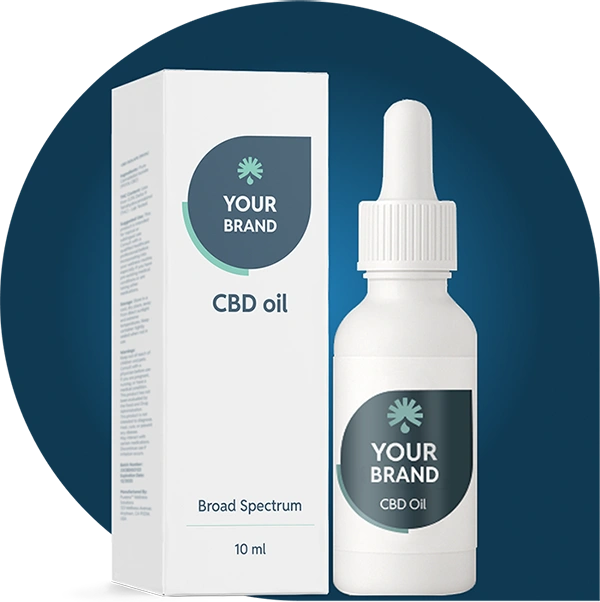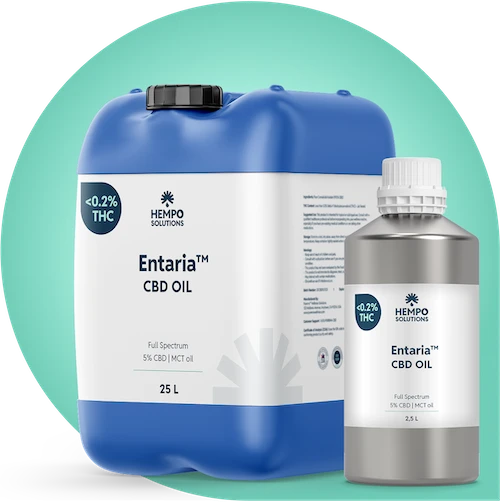What is CBD? (Cannabidiol)
CBD (cannabidiol) is one of over 100 cannabinoids found in the hemp plant. It is non-psychoactive, meaning it does not cause intoxication like THC. Typically extracted from hemp, CBD is used in a variety of product formats and is the subject of ongoing research for its potential wellness applications.
Cannabinoids such as CBD are produced in resin-filled trichomes, which are tiny glands on the flowers of hemp plants. These structures appear to help protect the plant from environmental stressors like pests, bacteria, and UV exposure.
Production process of CBD
The production of high-quality CBD oil involves several precise steps designed to deliver consistent, safe, and effective formulations.
Extraction is the starting point. CO2 extraction is widely used for its ability to produce clean, solvent-free extracts. Hempo Solutions employs a proprietary Double CO2 extraction method: first, a subcritical phase gently captures delicate terpenes, then a supercritical phase efficiently extracts cannabinoids and other actives. This preserves a rich, balanced phytochemical profile.
Decarboxylation is a key activation step. By applying controlled heat to the hemp material, acidic cannabinoids such as CBDA are converted into their active forms like CBD. This process ensures the final extract delivers consistent potency and performance across a wide range of applications.
Winterisation and filtration follow extraction. During winterisation, the crude extract is mixed with food-grade alcohol and chilled to remove unwanted waxes, fats, and plant lipids. Filtration then separates these solids, resulting in a clearer, more refined extract.
Distillation is next. This process further purifies and concentrates cannabinoids by separating them from residual compounds. Advanced distillation techniques ensure consistent potency and standardised cannabinoid profiles that meet strict quality specifications.
Formulation is the final step. The purified extract is blended with a suitable CBD carrier oil to achieve consumer-friendly concentrations, ensure accurate dosing, and enhance stability. Common carrier oils include MCT coconut oil and hemp seed oil, chosen for their mild taste, nutritional benefits, and formulation versatility.
How does CBD work?
CBD is thought to interact with the body’s endocannabinoid system (ECS), a regulatory network involved in maintaining balance across functions such as mood, sleep, appetite, pain perception, and immune response. Unlike THC, CBD has relatively low direct binding affinity for the ECS’s main receptors, CB1 and CB2. Instead, research suggests it may influence the ECS indirectly by inhibiting the FAAH enzyme, which breaks down the endocannabinoid anandamide, potentially increasing its levels in the body.
Beyond the ECS, CBD is also reported to interact with other receptor systems, including TRPV1 channels involved in pain signalling, 5-HT1A serotonin receptors linked to mood and anxiety, and PPARs that can affect inflammation. These complex and interconnected mechanisms may help explain its potential to support relief from inflammation, stress, and improve sleep.
What are the benefits of CBD?
CBD is widely recognised for its anti-inflammatory properties, its potential to support mental health, and its reported benefits for improving sleep. Many people have used CBD products for years and share positive experiences, while scientific research continues to explore its range of effects. This growing body of evidence suggests promising applications for wellness and self-care, even as further study is needed to fully understand its therapeutic potential.
CBD for Anxiety and Depression
CBD is widely used by people seeking natural support for anxiety and mood balance. Many users report feeling calmer or less anxious with CBD products. Scientific interest in this area is growing, with emerging research suggesting potential benefits.
Key research findings include:
-
A 2024 systematic review found significant reductions in social anxiety symptoms in participants using CBD.
-
Another 2022 study observed improvements in anxiety and depression scores in young people unresponsive to standard treatments.
-
A 2022 clinical trial indicated that CBD may reduce anxiety symptoms within four weeks of use.
CBD is thought to act on serotonin receptors and modulate the body’s stress response. While these early results are promising, further large-scale studies are needed to confirm effectiveness and guide safe formulation for consumer products.
CBD and Sleep Quality
Improving sleep is one of the most common reasons consumers use CBD products. Many users report more restful sleep and easier relaxation. Scientific studies suggest CBD may help support better sleep by addressing factors such as anxiety, pain, and overall discomfort.
Supporting evidence:
-
Research indicates CBD may reduce sleep disturbances and help extend sleep duration in some participants.
-
A 2019 review highlighted CBD’s potential to support sleep in people with anxiety-related disorders.
While individual results vary, these findings support the development of CBD formulations aimed at promoting restful sleep as part of a broader wellness strategy.

CBD and Epilepsy Syndromes
CBD is the active compound in Epidiolex (Epidyolex in Europe), the first plant-derived cannabis medicine approved for medical use in the US and EU. It is licensed specifically for the treatment of seizures associated with Lennox-Gastaut and Dravet syndromes, two severe forms of childhood epilepsy.
Key approval details:
-
Approved by the FDA in 2018 and EMA in 2019.
-
Backed by three large-scale clinical trials involving over 500 patients.
-
Demonstrated significant reductions in seizure frequency.
This prescription use highlights CBD’s validated therapeutic potential for specific conditions while underscoring the importance of differentiating medical-grade products from wellness supplements.
CBD and PTSD Symptoms
CBD is being investigated for its potential to help manage symptoms of post-traumatic stress disorder (PTSD). Many users report feeling calmer and less reactive to triggers.
Supporting study:
-
A 2019 case series found that patients receiving CBD alongside standard psychiatric care experienced reductions in PTSD-related symptoms over eight weeks.
Researchers suggest that CBD’s anxiolytic properties and influence on memory processing could support these effects. While promising, these findings are preliminary, and CBD is best viewed as a complementary option within comprehensive mental health care strategies.
CBD and Opioid Addiction
Emerging evidence suggests CBD may help support individuals managing opioid dependence by reducing certain withdrawal symptoms.
Key findings include:
-
2022 study indicated that CBD may reduce anxiety and cravings associated with opioid withdrawal.
-
One study observed reductions in resting heart rate and self-reported anxiety without major side effects.
-
CBD’s potential anxiolytic and analgesic properties may contribute to supporting people through withdrawal discomfort.
While these results are encouraging, further rigorous studies are needed to establish CBD’s role in comprehensive addiction management strategies.
CBD and ALS Symptoms
CBD is being researched for its potential to help manage symptoms of neurological conditions such as amyotrophic lateral sclerosis (ALS). While there is no cure for ALS, patients often seek supportive approaches to maintain quality of life.
CBD’s reported anti-inflammatory and antioxidative properties have led researchers to investigate its potential to help manage some ALS-related symptoms.
Possible benefits for ALS patients include:
-
Supporting muscle relaxation.
-
Helping maintain appetite.
-
Potentially improving sleep quality.
Although research in this area remains limited and largely preclinical, the interest in CBD as part of a comprehensive symptom management plan continues to grow. Brands considering products in this space should be clear about the emerging nature of the evidence and avoid unverified health claims.
CBD and Chronic Pain Relief
Chronic pain is one of the most cited reasons people turn to CBD products. Many users report relief from discomfort, inflammation, and related sleep issues.
Evidence and approvals include:
-
Canada has approved Sativex, an oral spray combining THC and CBD, for the treatment of neuropathic pain in multiple sclerosis and certain cancer pain.
-
A 2023 US study found that topical CBD may reduce pain and discomfort associated with peripheral neuropathy, without significant side effects.
These findings suggest CBD may offer supportive relief for some forms of chronic pain, though it is important to note that approvals like Sativex apply to specific THC-CBD combinations and not all over-the-counter CBD products. Brands should emphasise responsible labelling and clear communication about product composition and intended use.

CBD and Diabetic Complications
Research is exploring CBD’s potential role in supporting the management of complications linked to diabetes. While early findings are mostly preclinical or small-scale, they suggest CBD may have beneficial effects worth investigating further.
Key areas of study include:
-
In vitro research indicates CBD may reduce oxidative stress and inflammation triggered by high glucose levels.
-
A small human study found that CBD may help modulate hormones linked to insulin resistance in people with type 2 diabetes who are not on insulin therapy.
While these early results are encouraging, more robust clinical trials are needed to confirm CBD’s safety and effectiveness in this context. Brands should take care to present these findings transparently, without implying proven treatment for diabetes itself.
CBD and Neurological Diseases
CBD’s potential neuroprotective properties are of significant interest to researchers investigating a range of neurological conditions.
Areas of ongoing study include:
-
A 2023 observational Pilot study found that CBD may have been the primary reason for improvements for people that suffer from Parkinson’s disease and Alzheimer’s disease, it was discovered that CBD’s anti-inflammatory and antioxidant effects may have helped to reduce neurodegeneration.
-
Autism spectrum disorder, where researchers are exploring whether CBD may support behavioural management.
-
Motor disorders such as cerebral palsy, examining if CBD can help manage muscle spasticity and discomfort.
While these applications are promising, much of the evidence remains at preclinical or early clinical stages. Brands should communicate these potential benefits responsibly, avoiding overstatements while acknowledging the strong interest among consumers and researchers alike.
CBD and Cancer-Related Symptoms
CBD is also being studied for its potential to help manage symptoms related to cancer and its treatments. Many patients report seeking CBD products to address discomfort and improve quality of life.
Potential supportive effects include:
-
Helping manage nausea and vomiting, particularly in patients undergoing chemotherapy.
-
Supporting relief from cancer-related pain.
-
Improving appetite and sleep quality.
Research in this area remains early, with most findings based on small clinical trials or anecdotal reports. While CBD shows promise as part of supportive care, it is essential for brands to avoid suggesting it can treat or cure cancer itself, and to encourage consumers to consult healthcare professionals about its use alongside conventional treatments.
Other Potential Benefits of CBD
Other possible benefits of CBD include supporting cardiovascular health and managing certain skin conditions. Interest in CBD’s impact on cardiovascular health comes from its reported anti-inflammatory effects on blood vessels. Early human studies suggest CBD may help reduce resting blood pressure and mitigate stress-induced increase in blood pressure, although research remains limited and further large-scale trials are needed.
In addition, current research is examining CBD’s potential role in dermatology. Its anti-inflammatory and antimicrobial properties suggest it may help manage skin conditions such as acne, eczema, and psoriasis. For acne specifically, studies have looked at CBD’s ability to reduce sebum production and calm inflammation, indicating possible benefits for formulations targeting clearer, healthier-looking skin.
Potential Risks and Side Effects of CBD
While CBD is generally considered safe, it is not without potential risks and side effects. Some users may experience mild adverse reactions such as diarrhoea, changes in appetite or weight, and fatigue. More serious side effects, including abnormal liver enzyme levels, drowsiness, and sedation, have been observed in paediatric epilepsy trials, often due to interactions with other medications such as clobazam.
Given these potential risks, it is crucial for consumers to consult healthcare professionals to determine appropriate use and understand possible interactions with existing medications. For brands, this highlights the importance of transparent communication and careful formulation.
Quality can also vary significantly across the CBD market, making rigorous testing essential. Reliable manufacturers address this by conducting third-party lab tests to confirm cannabinoid content, check for contaminants such as residual solvents or heavy metals, and ensure batch consistency. At Hempo Solutions, for example, all products undergo third-party testing with detailed batch reports available online, supporting customer trust and meeting regulatory expectations for quality assurance.
Terpenes and CBD
Terpenes are aromatic compounds found in many plants, including hemp, that contribute to their distinctive scents and flavours. Beyond these sensory properties, terpenes are being studied for their potential to work synergistically with cannabinoids in what is often called the “entourage effect.” This concept suggests that combining CBD with other cannabinoids and specific terpene profiles may enhance the perceived benefits compared to isolated CBD alone.
Research indicates terpenes may influence how cannabinoids interact with the body’s systems, potentially affecting factors like absorption or receptor activity. For example, certain terpenes are being examined for their ability to modulate permeability through cell membranes or for their own possible calming, anti-inflammatory, or analgesic effects.
For brands developing full-spectrum or broad-spectrum CBD products, understanding terpene profiles and their possible contributions can support clear, responsible marketing. Emphasising transparent labelling, third-party testing for terpene content, and accurate descriptions of product composition can help build trust with informed consumers seeking well-rounded formulations.

Future Research and Clinical Trials of CBD
As interest in the potential benefits of CBD grows, so does the need for deeper scientific understanding and long-term research. Scientists are especially focused on clarifying how CBD interacts with the body’s endocannabinoid system and other biological pathways to deliver its potential effects.
Key research priorities include:
-
Conducting extensive clinical trials to evaluate long-term safety and effectiveness.
-
Investigating interactions with other medications.
-
Determining appropriate dosages for specific uses.
-
Exploring mental health applications such as anxiety, depression, PTSD, and schizophrenia.
For manufacturers and brand owners, staying up to date with emerging research is essential.
Benefits of staying informed include:
-
Supporting the development of well-informed formulations.
-
Enabling responsible, evidence-based marketing.
-
Meeting evolving regulatory expectations with clear, accurate communication.
Summary of CBD Benefits
CBD offers a wide range of potential benefits, from supporting sleep and stress management to exploring roles in chronic pain and neurological conditions. While growing research highlights promising applications, it is essential to communicate these effects responsibly and emphasise the need for ongoing study.
For retail brands and manufacturers, understanding both the opportunities and the limits of current evidence is key to developing high-quality, compliant products. Staying informed about research developments, investing in transparent labelling, and prioritising rigorous testing will help meet consumer expectations while building trust in the growing CBD market.







